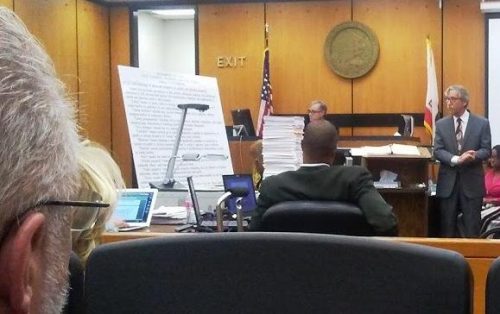 ‘We Fought a War’ Over Discrimination, Assert Plaintiffs – City Denies Wrongdoing
‘We Fought a War’ Over Discrimination, Assert Plaintiffs – City Denies Wrongdoing
By Cres Vellucci
Sacramento Superior Court Judge Christopher E. Krueger Thursday sent the jury into deliberations after both sides presented intriguing, if not often but expected contradictory, final arguments in the “Homeless” v. City of Sacramento lawsuit attacking the constitutionality of a controversial “no-camping” ordinance.
The case, which began Oct. 23 with pre-trial arguments and heard nearly a week of testimony and many “sidebar” and “in chambers” debates and discussions between Judge Krueger and Plaintiff (homeless) attorney Mark Merin and City Assistant Attorney Chance Trimm.
Plaintiffs claim the city’s “anti-camping” ordinance has been – for 22 years – selectively enforced against the homeless, and virtually no one else, in Sacramento. Both sides stipulated 4,368 citations have been issued in recent years under the law.
The lawsuit began in 2009 when a small homeless community, referred to as the “Safeground Pioneers,” was arrested for camping on a private lot of 
land, despite having permission from its property owner. The individuals were arrested under Sacramento’s no camping ordinance.
“I ask the jury to be fair and just,” said Merin in closing, after pointing out that much of what the City presented at court had nothing to do with the claim that the no camping ordinance is selectively applied to the homeless as compared to other residents of the city.
“We fought a civil war over this issue (discrimination). We don’t discriminate for race, for color or origin,” said Merin, emphasizing the no camping law as applied has a “discriminatory effect” on the homeless. “Where can the homeless go? The city has used the ordinance to move the homeless. There is nowhere for them go.
“The City has removed them from public property, private property, seized all their possessions…officers testified they didn’t arrest non-homeless campers because they had a place to go. The homeless do not. That’s selective enforcement. The no camping law is intended to punish and harm the Plaintiffs, the homeless,” Merin said.
“You (the jury) heard that while the City pretends this is only about the C Street safe ground on C Street in 2009, it is about people who have no place to go. You won’t find anyone in that pile (of 4,000 plus citations) who are not homeless. The fact the city claims it doesn’t know about camping at Camp Pollock is preposterous,” said Merin.
The City’s Trimm claimed in his closing that the camping laws are “enforced evenly across the board for everyone,” and denied assertions that the law is selectively enforced. “You (the jury) are being asked to believe the City wanted to target the homeless,” by the Plaintiffs, he said.
“Mark Zoulas (for SPD officer, now retired, who headed the homeless unit) wanted to help the homeless. When they made arrests of the homeless, they didn’t have a choice. (We) almost begged them to leave…it was unfortunate, ” added Trimm, maintaining the City had no official policy to target the homeless by using the no camping law.
Trimm said there were only 1.5 citations issued a day…”that doesn’t look like we’re targeting the homeless…there are estimates of 3,000 to 6,000 homeless, said Trimm, who told the jury that the examples Merin had of non-homeless campers not being arrested were minuscule. “You’d think he (Merin) could come up more than that,” he quipped.
Merin countered that in his final rebuttal, noting that the 4,000 plus citations told just part of the story – the City issued just 15 citations in 2007, but by 2014, the citations were topping 1,000 per year as the City tried to drive the homeless out of the City, he said.
But the citations – which are really arrests but those arrested are not taken to jail – are just part of the harassment of the homeless, said Merin. “There was other enforcement action…officers would come up to homeless sleeping in doorways and tell them to move on or risk arrest,” he said.
Merin explained that the four examples he gave of non-homeless people camping out and not arrested were “just that, examples…” and that there were many other incidences where non-homeless were allowed to camp on public property and/or private property without a property owner’s permission.
The jury will be in deliberation daily, Monday through Friday, until it reaches a verdict.
Come see the Vanguard Event – “In Search of Gideon” – which highlights some of the key work performed by the Yolo County Public Defender’s Office…





The jury came in with a verdict, 9-3 ruling against the homeless plaintiffs.
“Late Thursday, after less than a day of deliberation, the jury voted 9-3 in favor of the City, rejecting the claim by lawyers for the homeless that the no camping law is unconstitutional because it is used selectively against the homeless and not other residents of Sacramento.”